Land Law: Analysis of Covenants, Easements, and Property Rights
VerifiedAdded on 2023/04/21
|10
|3146
|257
Essay
AI Summary
This essay provides a comprehensive analysis of various land law principles, focusing on the enforceability of covenants and property rights. It examines the burden and benefit of covenants imposed by the Earl of Somerset, addressing whether the covenant was annexed to the deed and the impact of ...

Name
Institution
Date
Institution
Date
Paraphrase This Document
Need a fresh take? Get an instant paraphrase of this document with our AI Paraphraser
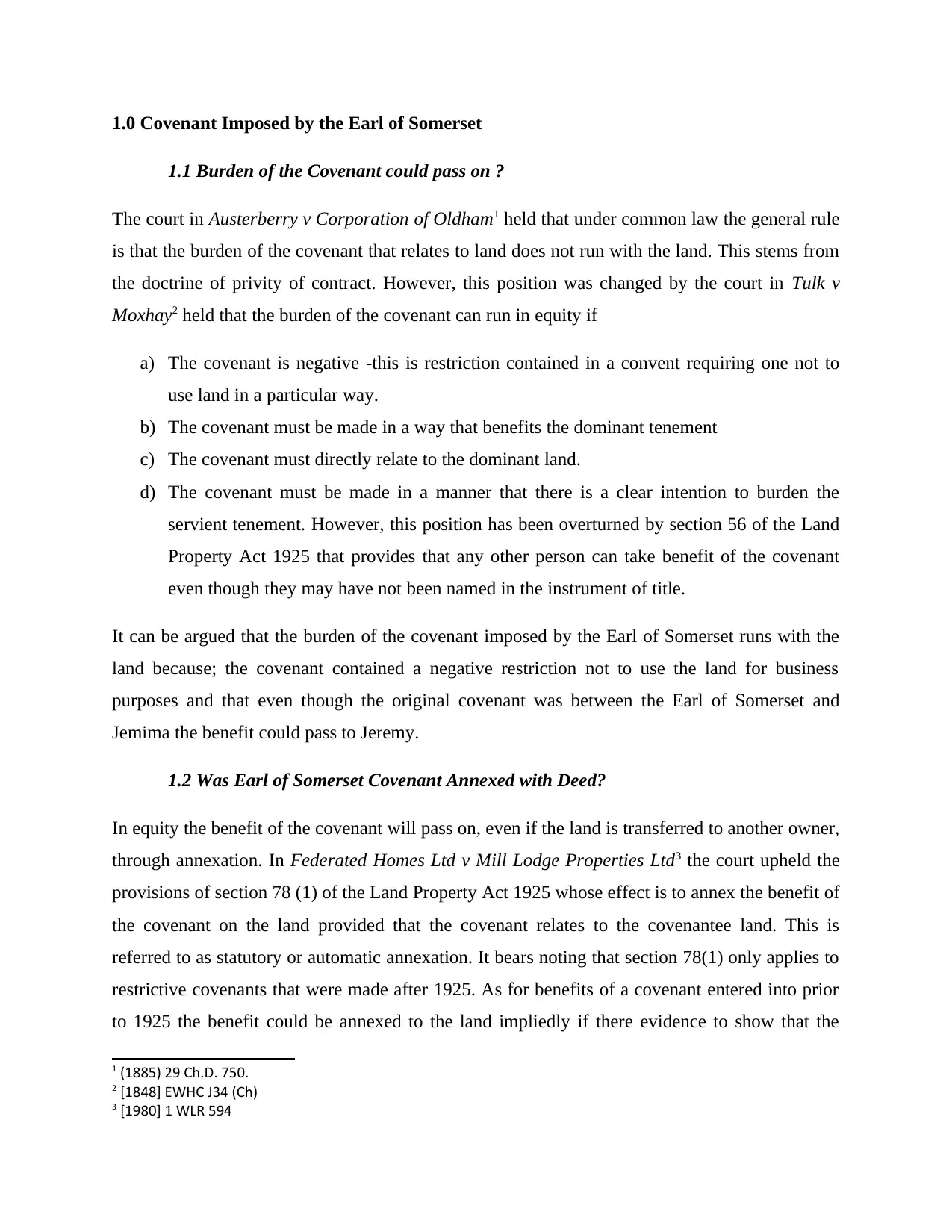
1.0 Covenant Imposed by the Earl of Somerset
1.1 Burden of the Covenant could pass on ?
The court in Austerberry v Corporation of Oldham1 held that under common law the general rule
is that the burden of the covenant that relates to land does not run with the land. This stems from
the doctrine of privity of contract. However, this position was changed by the court in Tulk v
Moxhay2 held that the burden of the covenant can run in equity if
a) The covenant is negative -this is restriction contained in a convent requiring one not to
use land in a particular way.
b) The covenant must be made in a way that benefits the dominant tenement
c) The covenant must directly relate to the dominant land.
d) The covenant must be made in a manner that there is a clear intention to burden the
servient tenement. However, this position has been overturned by section 56 of the Land
Property Act 1925 that provides that any other person can take benefit of the covenant
even though they may have not been named in the instrument of title.
It can be argued that the burden of the covenant imposed by the Earl of Somerset runs with the
land because; the covenant contained a negative restriction not to use the land for business
purposes and that even though the original covenant was between the Earl of Somerset and
Jemima the benefit could pass to Jeremy.
1.2 Was Earl of Somerset Covenant Annexed with Deed?
In equity the benefit of the covenant will pass on, even if the land is transferred to another owner,
through annexation. In Federated Homes Ltd v Mill Lodge Properties Ltd3 the court upheld the
provisions of section 78 (1) of the Land Property Act 1925 whose effect is to annex the benefit of
the covenant on the land provided that the covenant relates to the covenantee land. This is
referred to as statutory or automatic annexation. It bears noting that section 78(1) only applies to
restrictive covenants that were made after 1925. As for benefits of a covenant entered into prior
to 1925 the benefit could be annexed to the land impliedly if there evidence to show that the
1 (1885) 29 Ch.D. 750.
2 [1848] EWHC J34 (Ch)
3 [1980] 1 WLR 594
1.1 Burden of the Covenant could pass on ?
The court in Austerberry v Corporation of Oldham1 held that under common law the general rule
is that the burden of the covenant that relates to land does not run with the land. This stems from
the doctrine of privity of contract. However, this position was changed by the court in Tulk v
Moxhay2 held that the burden of the covenant can run in equity if
a) The covenant is negative -this is restriction contained in a convent requiring one not to
use land in a particular way.
b) The covenant must be made in a way that benefits the dominant tenement
c) The covenant must directly relate to the dominant land.
d) The covenant must be made in a manner that there is a clear intention to burden the
servient tenement. However, this position has been overturned by section 56 of the Land
Property Act 1925 that provides that any other person can take benefit of the covenant
even though they may have not been named in the instrument of title.
It can be argued that the burden of the covenant imposed by the Earl of Somerset runs with the
land because; the covenant contained a negative restriction not to use the land for business
purposes and that even though the original covenant was between the Earl of Somerset and
Jemima the benefit could pass to Jeremy.
1.2 Was Earl of Somerset Covenant Annexed with Deed?
In equity the benefit of the covenant will pass on, even if the land is transferred to another owner,
through annexation. In Federated Homes Ltd v Mill Lodge Properties Ltd3 the court upheld the
provisions of section 78 (1) of the Land Property Act 1925 whose effect is to annex the benefit of
the covenant on the land provided that the covenant relates to the covenantee land. This is
referred to as statutory or automatic annexation. It bears noting that section 78(1) only applies to
restrictive covenants that were made after 1925. As for benefits of a covenant entered into prior
to 1925 the benefit could be annexed to the land impliedly if there evidence to show that the
1 (1885) 29 Ch.D. 750.
2 [1848] EWHC J34 (Ch)
3 [1980] 1 WLR 594
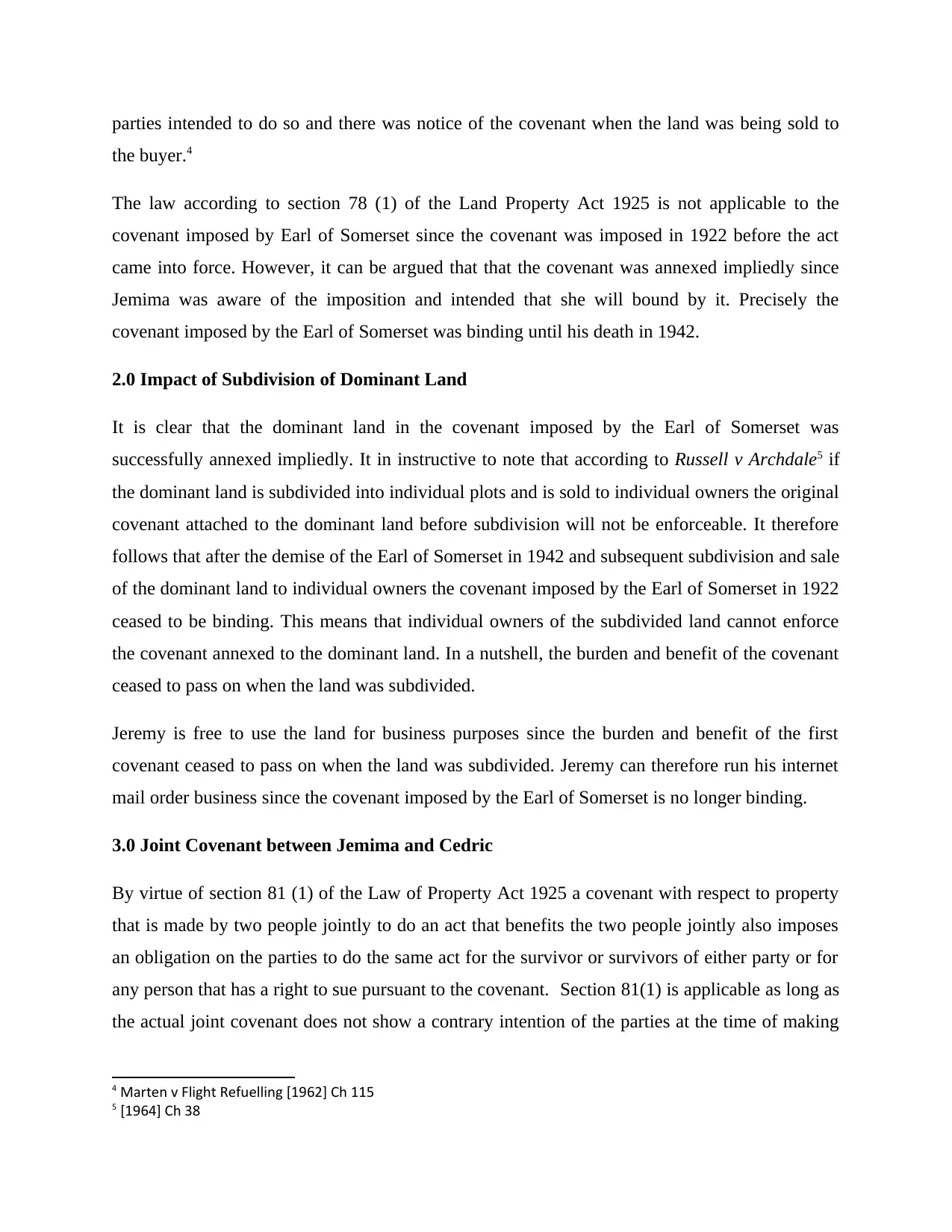
parties intended to do so and there was notice of the covenant when the land was being sold to
the buyer.4
The law according to section 78 (1) of the Land Property Act 1925 is not applicable to the
covenant imposed by Earl of Somerset since the covenant was imposed in 1922 before the act
came into force. However, it can be argued that that the covenant was annexed impliedly since
Jemima was aware of the imposition and intended that she will bound by it. Precisely the
covenant imposed by the Earl of Somerset was binding until his death in 1942.
2.0 Impact of Subdivision of Dominant Land
It is clear that the dominant land in the covenant imposed by the Earl of Somerset was
successfully annexed impliedly. It in instructive to note that according to Russell v Archdale5 if
the dominant land is subdivided into individual plots and is sold to individual owners the original
covenant attached to the dominant land before subdivision will not be enforceable. It therefore
follows that after the demise of the Earl of Somerset in 1942 and subsequent subdivision and sale
of the dominant land to individual owners the covenant imposed by the Earl of Somerset in 1922
ceased to be binding. This means that individual owners of the subdivided land cannot enforce
the covenant annexed to the dominant land. In a nutshell, the burden and benefit of the covenant
ceased to pass on when the land was subdivided.
Jeremy is free to use the land for business purposes since the burden and benefit of the first
covenant ceased to pass on when the land was subdivided. Jeremy can therefore run his internet
mail order business since the covenant imposed by the Earl of Somerset is no longer binding.
3.0 Joint Covenant between Jemima and Cedric
By virtue of section 81 (1) of the Law of Property Act 1925 a covenant with respect to property
that is made by two people jointly to do an act that benefits the two people jointly also imposes
an obligation on the parties to do the same act for the survivor or survivors of either party or for
any person that has a right to sue pursuant to the covenant. Section 81(1) is applicable as long as
the actual joint covenant does not show a contrary intention of the parties at the time of making
4 Marten v Flight Refuelling [1962] Ch 115
5 [1964] Ch 38
the buyer.4
The law according to section 78 (1) of the Land Property Act 1925 is not applicable to the
covenant imposed by Earl of Somerset since the covenant was imposed in 1922 before the act
came into force. However, it can be argued that that the covenant was annexed impliedly since
Jemima was aware of the imposition and intended that she will bound by it. Precisely the
covenant imposed by the Earl of Somerset was binding until his death in 1942.
2.0 Impact of Subdivision of Dominant Land
It is clear that the dominant land in the covenant imposed by the Earl of Somerset was
successfully annexed impliedly. It in instructive to note that according to Russell v Archdale5 if
the dominant land is subdivided into individual plots and is sold to individual owners the original
covenant attached to the dominant land before subdivision will not be enforceable. It therefore
follows that after the demise of the Earl of Somerset in 1942 and subsequent subdivision and sale
of the dominant land to individual owners the covenant imposed by the Earl of Somerset in 1922
ceased to be binding. This means that individual owners of the subdivided land cannot enforce
the covenant annexed to the dominant land. In a nutshell, the burden and benefit of the covenant
ceased to pass on when the land was subdivided.
Jeremy is free to use the land for business purposes since the burden and benefit of the first
covenant ceased to pass on when the land was subdivided. Jeremy can therefore run his internet
mail order business since the covenant imposed by the Earl of Somerset is no longer binding.
3.0 Joint Covenant between Jemima and Cedric
By virtue of section 81 (1) of the Law of Property Act 1925 a covenant with respect to property
that is made by two people jointly to do an act that benefits the two people jointly also imposes
an obligation on the parties to do the same act for the survivor or survivors of either party or for
any person that has a right to sue pursuant to the covenant. Section 81(1) is applicable as long as
the actual joint covenant does not show a contrary intention of the parties at the time of making
4 Marten v Flight Refuelling [1962] Ch 115
5 [1964] Ch 38
⊘ This is a preview!⊘
Do you want full access?
Subscribe today to unlock all pages.

Trusted by 1+ million students worldwide
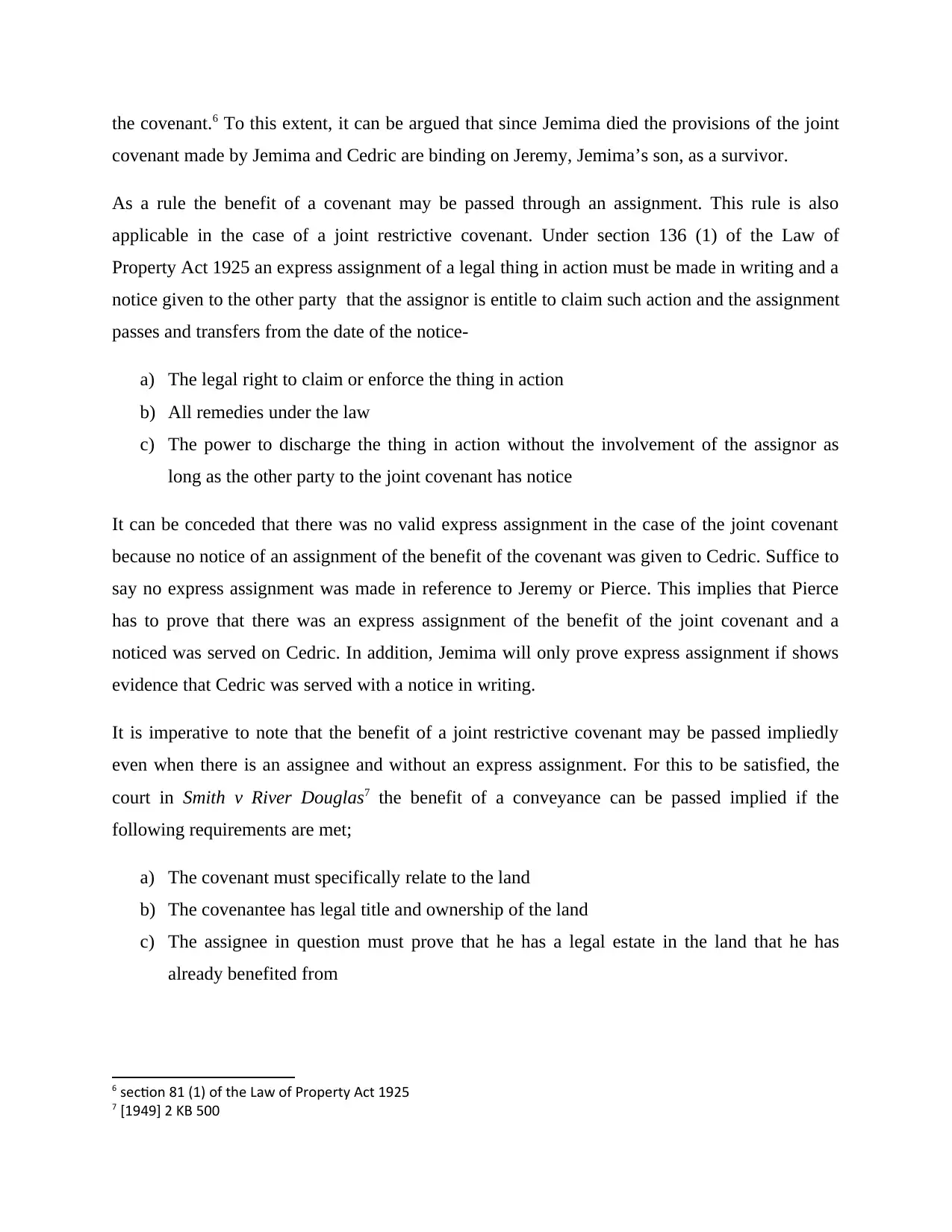
the covenant.6 To this extent, it can be argued that since Jemima died the provisions of the joint
covenant made by Jemima and Cedric are binding on Jeremy, Jemima’s son, as a survivor.
As a rule the benefit of a covenant may be passed through an assignment. This rule is also
applicable in the case of a joint restrictive covenant. Under section 136 (1) of the Law of
Property Act 1925 an express assignment of a legal thing in action must be made in writing and a
notice given to the other party that the assignor is entitle to claim such action and the assignment
passes and transfers from the date of the notice-
a) The legal right to claim or enforce the thing in action
b) All remedies under the law
c) The power to discharge the thing in action without the involvement of the assignor as
long as the other party to the joint covenant has notice
It can be conceded that there was no valid express assignment in the case of the joint covenant
because no notice of an assignment of the benefit of the covenant was given to Cedric. Suffice to
say no express assignment was made in reference to Jeremy or Pierce. This implies that Pierce
has to prove that there was an express assignment of the benefit of the joint covenant and a
noticed was served on Cedric. In addition, Jemima will only prove express assignment if shows
evidence that Cedric was served with a notice in writing.
It is imperative to note that the benefit of a joint restrictive covenant may be passed impliedly
even when there is an assignee and without an express assignment. For this to be satisfied, the
court in Smith v River Douglas7 the benefit of a conveyance can be passed implied if the
following requirements are met;
a) The covenant must specifically relate to the land
b) The covenantee has legal title and ownership of the land
c) The assignee in question must prove that he has a legal estate in the land that he has
already benefited from
6 section 81 (1) of the Law of Property Act 1925
7 [1949] 2 KB 500
covenant made by Jemima and Cedric are binding on Jeremy, Jemima’s son, as a survivor.
As a rule the benefit of a covenant may be passed through an assignment. This rule is also
applicable in the case of a joint restrictive covenant. Under section 136 (1) of the Law of
Property Act 1925 an express assignment of a legal thing in action must be made in writing and a
notice given to the other party that the assignor is entitle to claim such action and the assignment
passes and transfers from the date of the notice-
a) The legal right to claim or enforce the thing in action
b) All remedies under the law
c) The power to discharge the thing in action without the involvement of the assignor as
long as the other party to the joint covenant has notice
It can be conceded that there was no valid express assignment in the case of the joint covenant
because no notice of an assignment of the benefit of the covenant was given to Cedric. Suffice to
say no express assignment was made in reference to Jeremy or Pierce. This implies that Pierce
has to prove that there was an express assignment of the benefit of the joint covenant and a
noticed was served on Cedric. In addition, Jemima will only prove express assignment if shows
evidence that Cedric was served with a notice in writing.
It is imperative to note that the benefit of a joint restrictive covenant may be passed impliedly
even when there is an assignee and without an express assignment. For this to be satisfied, the
court in Smith v River Douglas7 the benefit of a conveyance can be passed implied if the
following requirements are met;
a) The covenant must specifically relate to the land
b) The covenantee has legal title and ownership of the land
c) The assignee in question must prove that he has a legal estate in the land that he has
already benefited from
6 section 81 (1) of the Law of Property Act 1925
7 [1949] 2 KB 500
Paraphrase This Document
Need a fresh take? Get an instant paraphrase of this document with our AI Paraphraser
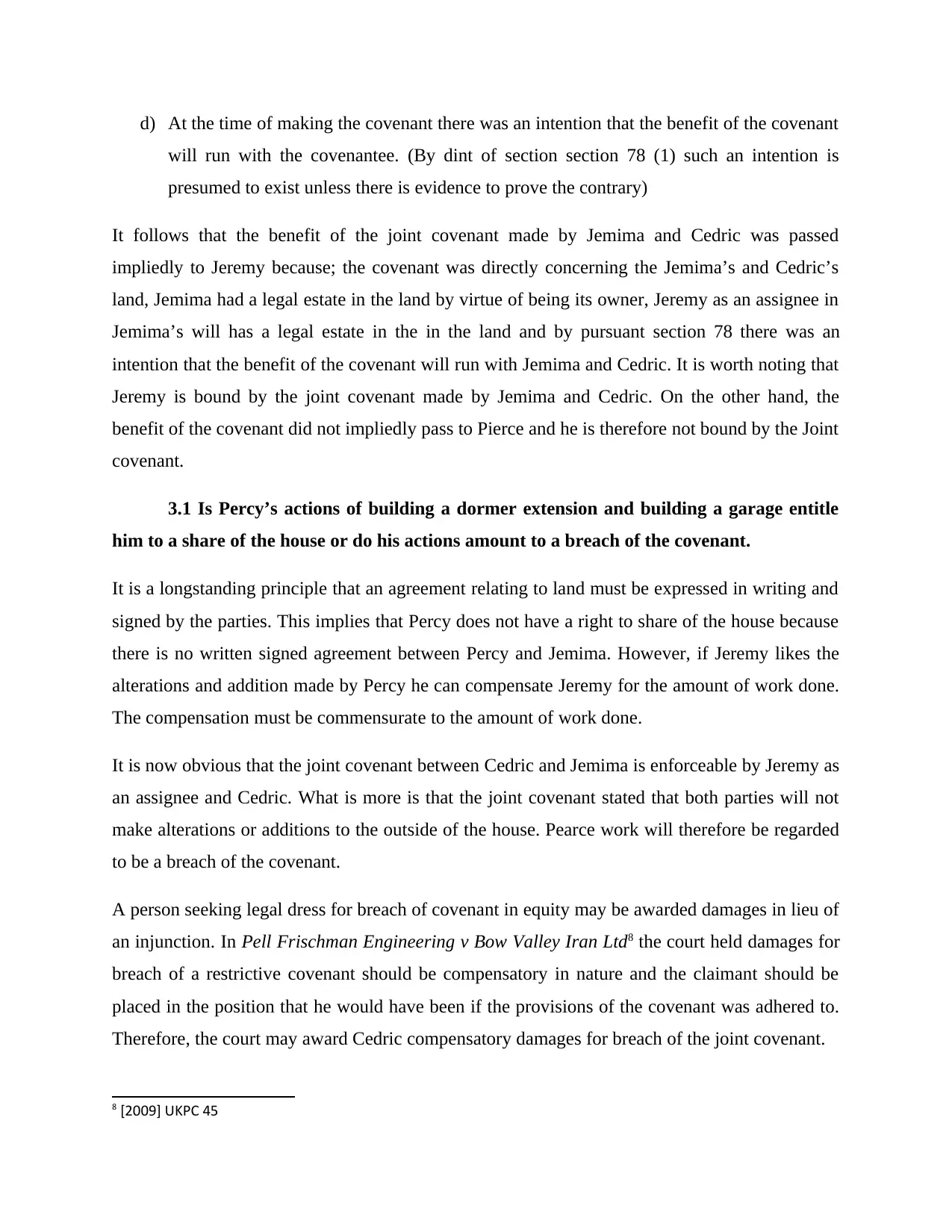
d) At the time of making the covenant there was an intention that the benefit of the covenant
will run with the covenantee. (By dint of section section 78 (1) such an intention is
presumed to exist unless there is evidence to prove the contrary)
It follows that the benefit of the joint covenant made by Jemima and Cedric was passed
impliedly to Jeremy because; the covenant was directly concerning the Jemima’s and Cedric’s
land, Jemima had a legal estate in the land by virtue of being its owner, Jeremy as an assignee in
Jemima’s will has a legal estate in the in the land and by pursuant section 78 there was an
intention that the benefit of the covenant will run with Jemima and Cedric. It is worth noting that
Jeremy is bound by the joint covenant made by Jemima and Cedric. On the other hand, the
benefit of the covenant did not impliedly pass to Pierce and he is therefore not bound by the Joint
covenant.
3.1 Is Percy’s actions of building a dormer extension and building a garage entitle
him to a share of the house or do his actions amount to a breach of the covenant.
It is a longstanding principle that an agreement relating to land must be expressed in writing and
signed by the parties. This implies that Percy does not have a right to share of the house because
there is no written signed agreement between Percy and Jemima. However, if Jeremy likes the
alterations and addition made by Percy he can compensate Jeremy for the amount of work done.
The compensation must be commensurate to the amount of work done.
It is now obvious that the joint covenant between Cedric and Jemima is enforceable by Jeremy as
an assignee and Cedric. What is more is that the joint covenant stated that both parties will not
make alterations or additions to the outside of the house. Pearce work will therefore be regarded
to be a breach of the covenant.
A person seeking legal dress for breach of covenant in equity may be awarded damages in lieu of
an injunction. In Pell Frischman Engineering v Bow Valley Iran Ltd8 the court held damages for
breach of a restrictive covenant should be compensatory in nature and the claimant should be
placed in the position that he would have been if the provisions of the covenant was adhered to.
Therefore, the court may award Cedric compensatory damages for breach of the joint covenant.
8 [2009] UKPC 45
will run with the covenantee. (By dint of section section 78 (1) such an intention is
presumed to exist unless there is evidence to prove the contrary)
It follows that the benefit of the joint covenant made by Jemima and Cedric was passed
impliedly to Jeremy because; the covenant was directly concerning the Jemima’s and Cedric’s
land, Jemima had a legal estate in the land by virtue of being its owner, Jeremy as an assignee in
Jemima’s will has a legal estate in the in the land and by pursuant section 78 there was an
intention that the benefit of the covenant will run with Jemima and Cedric. It is worth noting that
Jeremy is bound by the joint covenant made by Jemima and Cedric. On the other hand, the
benefit of the covenant did not impliedly pass to Pierce and he is therefore not bound by the Joint
covenant.
3.1 Is Percy’s actions of building a dormer extension and building a garage entitle
him to a share of the house or do his actions amount to a breach of the covenant.
It is a longstanding principle that an agreement relating to land must be expressed in writing and
signed by the parties. This implies that Percy does not have a right to share of the house because
there is no written signed agreement between Percy and Jemima. However, if Jeremy likes the
alterations and addition made by Percy he can compensate Jeremy for the amount of work done.
The compensation must be commensurate to the amount of work done.
It is now obvious that the joint covenant between Cedric and Jemima is enforceable by Jeremy as
an assignee and Cedric. What is more is that the joint covenant stated that both parties will not
make alterations or additions to the outside of the house. Pearce work will therefore be regarded
to be a breach of the covenant.
A person seeking legal dress for breach of covenant in equity may be awarded damages in lieu of
an injunction. In Pell Frischman Engineering v Bow Valley Iran Ltd8 the court held damages for
breach of a restrictive covenant should be compensatory in nature and the claimant should be
placed in the position that he would have been if the provisions of the covenant was adhered to.
Therefore, the court may award Cedric compensatory damages for breach of the joint covenant.
8 [2009] UKPC 45
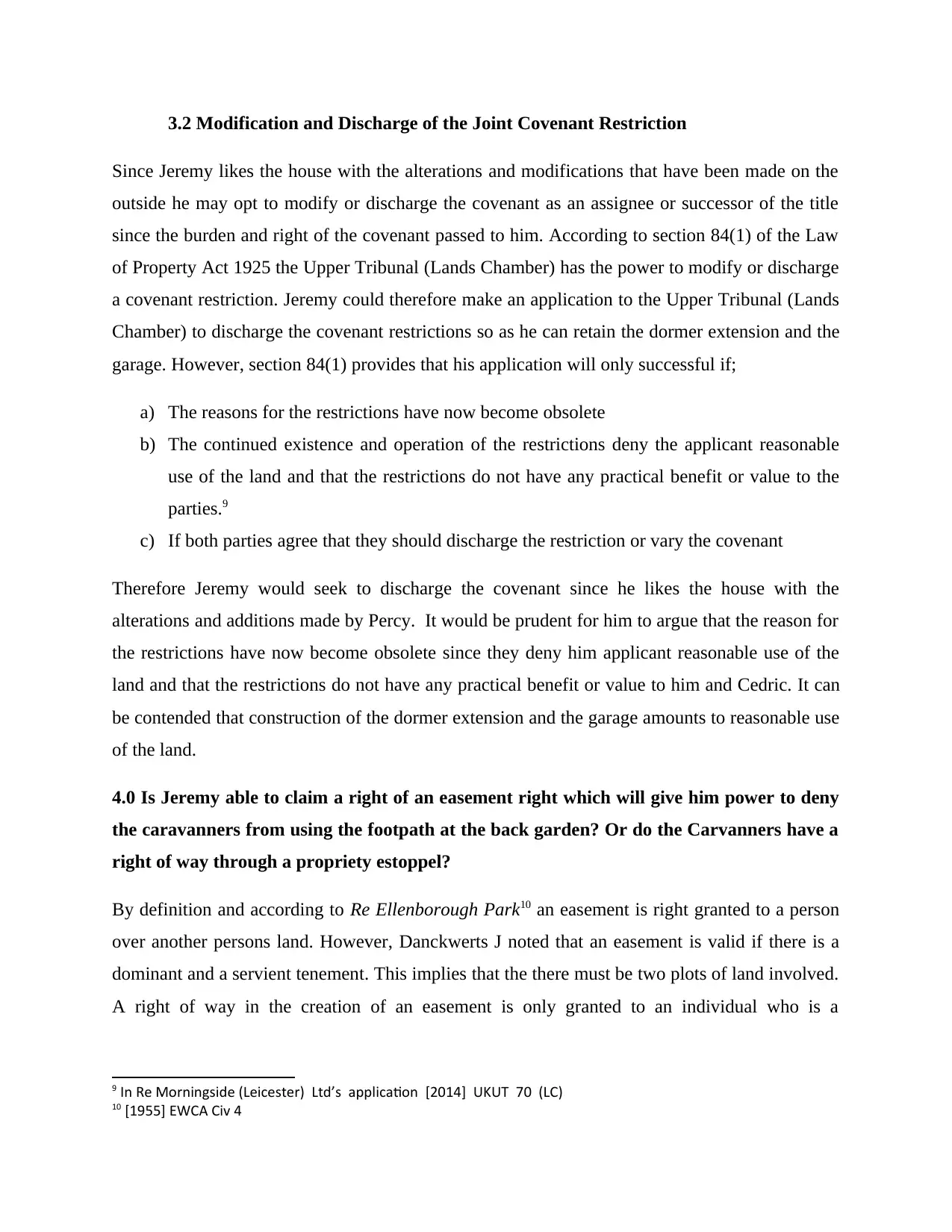
3.2 Modification and Discharge of the Joint Covenant Restriction
Since Jeremy likes the house with the alterations and modifications that have been made on the
outside he may opt to modify or discharge the covenant as an assignee or successor of the title
since the burden and right of the covenant passed to him. According to section 84(1) of the Law
of Property Act 1925 the Upper Tribunal (Lands Chamber) has the power to modify or discharge
a covenant restriction. Jeremy could therefore make an application to the Upper Tribunal (Lands
Chamber) to discharge the covenant restrictions so as he can retain the dormer extension and the
garage. However, section 84(1) provides that his application will only successful if;
a) The reasons for the restrictions have now become obsolete
b) The continued existence and operation of the restrictions deny the applicant reasonable
use of the land and that the restrictions do not have any practical benefit or value to the
parties.9
c) If both parties agree that they should discharge the restriction or vary the covenant
Therefore Jeremy would seek to discharge the covenant since he likes the house with the
alterations and additions made by Percy. It would be prudent for him to argue that the reason for
the restrictions have now become obsolete since they deny him applicant reasonable use of the
land and that the restrictions do not have any practical benefit or value to him and Cedric. It can
be contended that construction of the dormer extension and the garage amounts to reasonable use
of the land.
4.0 Is Jeremy able to claim a right of an easement right which will give him power to deny
the caravanners from using the footpath at the back garden? Or do the Carvanners have a
right of way through a propriety estoppel?
By definition and according to Re Ellenborough Park10 an easement is right granted to a person
over another persons land. However, Danckwerts J noted that an easement is valid if there is a
dominant and a servient tenement. This implies that the there must be two plots of land involved.
A right of way in the creation of an easement is only granted to an individual who is a
9 In Re Morningside (Leicester) Ltd’s application [2014] UKUT 70 (LC)
10 [1955] EWCA Civ 4
Since Jeremy likes the house with the alterations and modifications that have been made on the
outside he may opt to modify or discharge the covenant as an assignee or successor of the title
since the burden and right of the covenant passed to him. According to section 84(1) of the Law
of Property Act 1925 the Upper Tribunal (Lands Chamber) has the power to modify or discharge
a covenant restriction. Jeremy could therefore make an application to the Upper Tribunal (Lands
Chamber) to discharge the covenant restrictions so as he can retain the dormer extension and the
garage. However, section 84(1) provides that his application will only successful if;
a) The reasons for the restrictions have now become obsolete
b) The continued existence and operation of the restrictions deny the applicant reasonable
use of the land and that the restrictions do not have any practical benefit or value to the
parties.9
c) If both parties agree that they should discharge the restriction or vary the covenant
Therefore Jeremy would seek to discharge the covenant since he likes the house with the
alterations and additions made by Percy. It would be prudent for him to argue that the reason for
the restrictions have now become obsolete since they deny him applicant reasonable use of the
land and that the restrictions do not have any practical benefit or value to him and Cedric. It can
be contended that construction of the dormer extension and the garage amounts to reasonable use
of the land.
4.0 Is Jeremy able to claim a right of an easement right which will give him power to deny
the caravanners from using the footpath at the back garden? Or do the Carvanners have a
right of way through a propriety estoppel?
By definition and according to Re Ellenborough Park10 an easement is right granted to a person
over another persons land. However, Danckwerts J noted that an easement is valid if there is a
dominant and a servient tenement. This implies that the there must be two plots of land involved.
A right of way in the creation of an easement is only granted to an individual who is a
9 In Re Morningside (Leicester) Ltd’s application [2014] UKUT 70 (LC)
10 [1955] EWCA Civ 4
⊘ This is a preview!⊘
Do you want full access?
Subscribe today to unlock all pages.

Trusted by 1+ million students worldwide
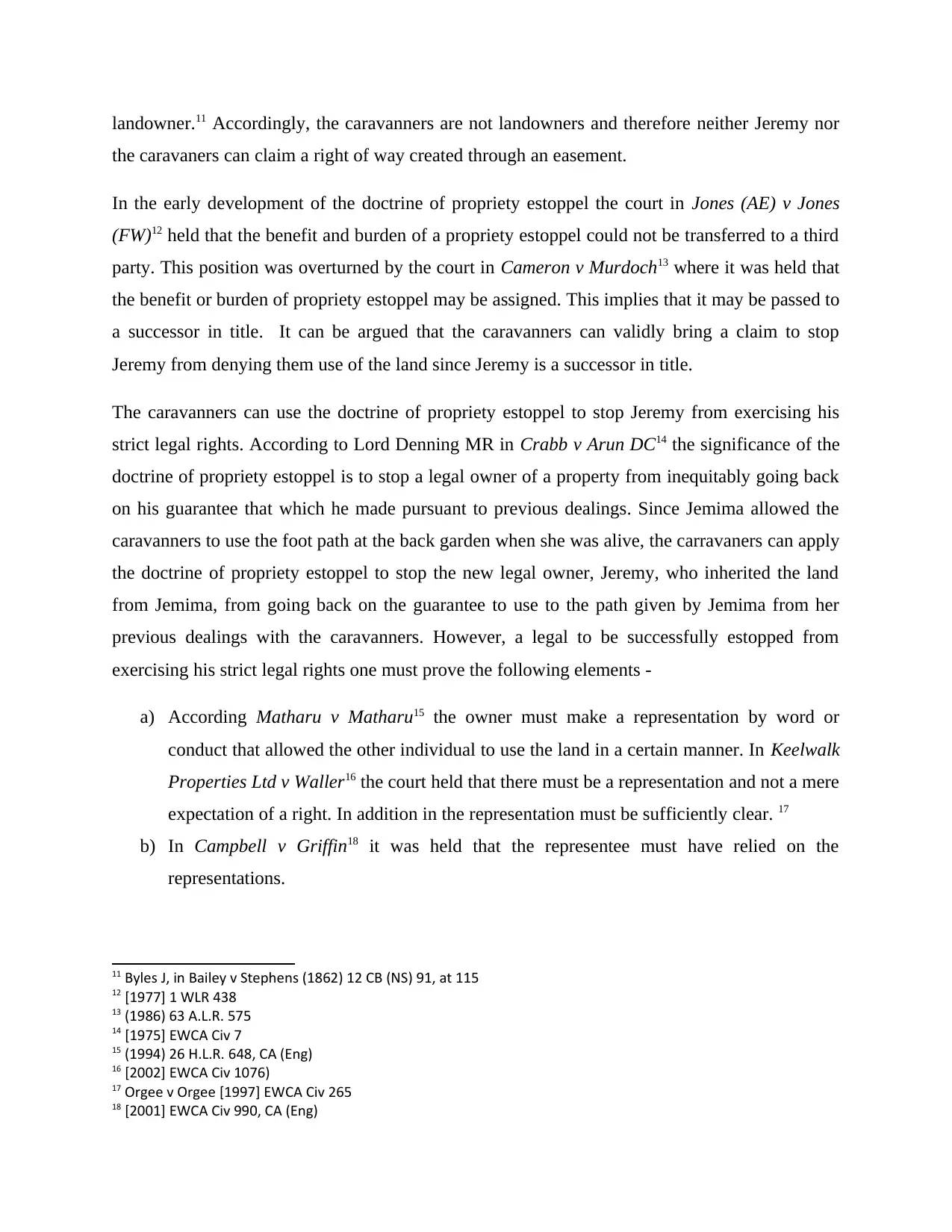
landowner.11 Accordingly, the caravanners are not landowners and therefore neither Jeremy nor
the caravaners can claim a right of way created through an easement.
In the early development of the doctrine of propriety estoppel the court in Jones (AE) v Jones
(FW)12 held that the benefit and burden of a propriety estoppel could not be transferred to a third
party. This position was overturned by the court in Cameron v Murdoch13 where it was held that
the benefit or burden of propriety estoppel may be assigned. This implies that it may be passed to
a successor in title. It can be argued that the caravanners can validly bring a claim to stop
Jeremy from denying them use of the land since Jeremy is a successor in title.
The caravanners can use the doctrine of propriety estoppel to stop Jeremy from exercising his
strict legal rights. According to Lord Denning MR in Crabb v Arun DC14 the significance of the
doctrine of propriety estoppel is to stop a legal owner of a property from inequitably going back
on his guarantee that which he made pursuant to previous dealings. Since Jemima allowed the
caravanners to use the foot path at the back garden when she was alive, the carravaners can apply
the doctrine of propriety estoppel to stop the new legal owner, Jeremy, who inherited the land
from Jemima, from going back on the guarantee to use to the path given by Jemima from her
previous dealings with the caravanners. However, a legal to be successfully estopped from
exercising his strict legal rights one must prove the following elements -
a) According Matharu v Matharu15 the owner must make a representation by word or
conduct that allowed the other individual to use the land in a certain manner. In Keelwalk
Properties Ltd v Waller16 the court held that there must be a representation and not a mere
expectation of a right. In addition in the representation must be sufficiently clear. 17
b) In Campbell v Griffin18 it was held that the representee must have relied on the
representations.
11 Byles J, in Bailey v Stephens (1862) 12 CB (NS) 91, at 115
12 [1977] 1 WLR 438
13 (1986) 63 A.L.R. 575
14 [1975] EWCA Civ 7
15 (1994) 26 H.L.R. 648, CA (Eng)
16 [2002] EWCA Civ 1076)
17 Orgee v Orgee [1997] EWCA Civ 265
18 [2001] EWCA Civ 990, CA (Eng)
the caravaners can claim a right of way created through an easement.
In the early development of the doctrine of propriety estoppel the court in Jones (AE) v Jones
(FW)12 held that the benefit and burden of a propriety estoppel could not be transferred to a third
party. This position was overturned by the court in Cameron v Murdoch13 where it was held that
the benefit or burden of propriety estoppel may be assigned. This implies that it may be passed to
a successor in title. It can be argued that the caravanners can validly bring a claim to stop
Jeremy from denying them use of the land since Jeremy is a successor in title.
The caravanners can use the doctrine of propriety estoppel to stop Jeremy from exercising his
strict legal rights. According to Lord Denning MR in Crabb v Arun DC14 the significance of the
doctrine of propriety estoppel is to stop a legal owner of a property from inequitably going back
on his guarantee that which he made pursuant to previous dealings. Since Jemima allowed the
caravanners to use the foot path at the back garden when she was alive, the carravaners can apply
the doctrine of propriety estoppel to stop the new legal owner, Jeremy, who inherited the land
from Jemima, from going back on the guarantee to use to the path given by Jemima from her
previous dealings with the caravanners. However, a legal to be successfully estopped from
exercising his strict legal rights one must prove the following elements -
a) According Matharu v Matharu15 the owner must make a representation by word or
conduct that allowed the other individual to use the land in a certain manner. In Keelwalk
Properties Ltd v Waller16 the court held that there must be a representation and not a mere
expectation of a right. In addition in the representation must be sufficiently clear. 17
b) In Campbell v Griffin18 it was held that the representee must have relied on the
representations.
11 Byles J, in Bailey v Stephens (1862) 12 CB (NS) 91, at 115
12 [1977] 1 WLR 438
13 (1986) 63 A.L.R. 575
14 [1975] EWCA Civ 7
15 (1994) 26 H.L.R. 648, CA (Eng)
16 [2002] EWCA Civ 1076)
17 Orgee v Orgee [1997] EWCA Civ 265
18 [2001] EWCA Civ 990, CA (Eng)
Paraphrase This Document
Need a fresh take? Get an instant paraphrase of this document with our AI Paraphraser
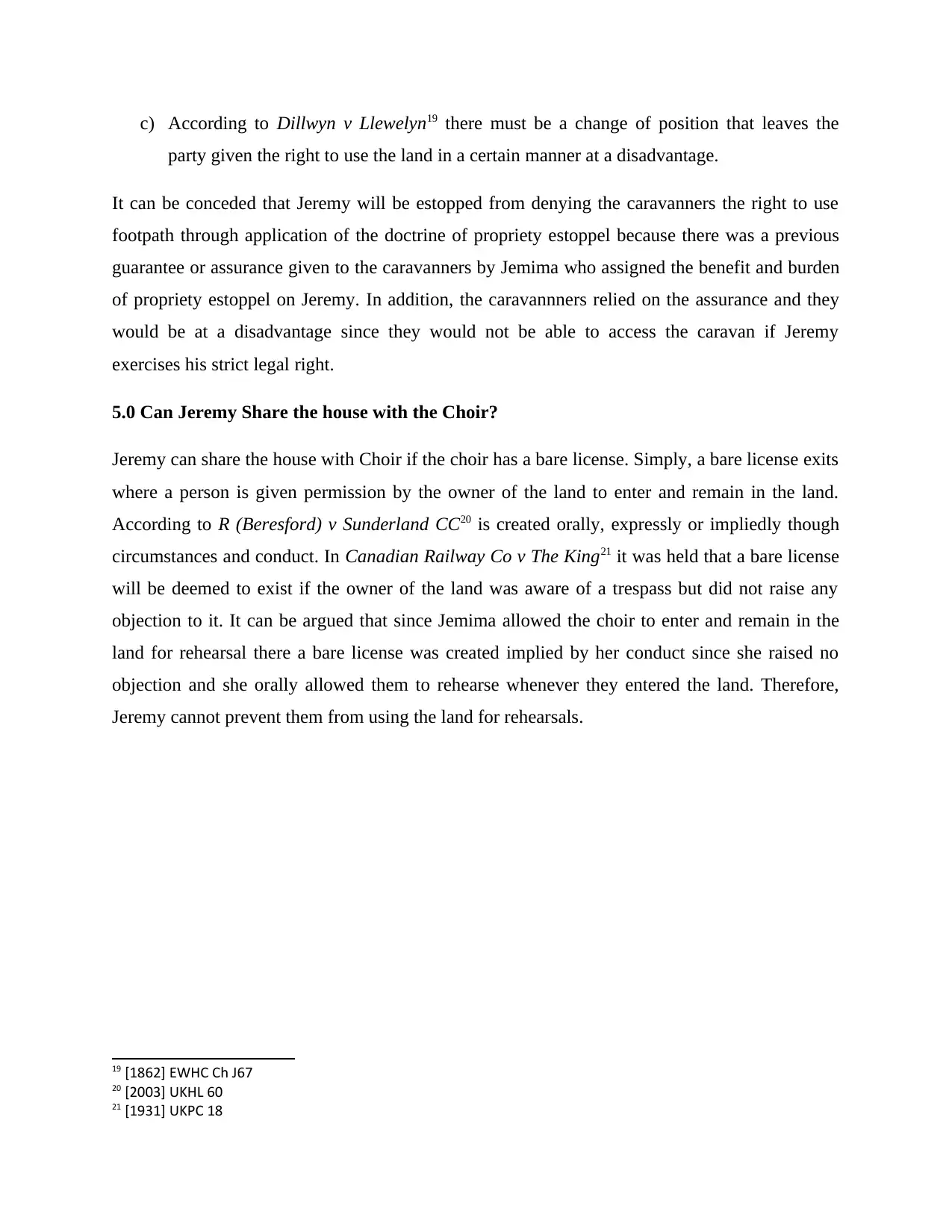
c) According to Dillwyn v Llewelyn19 there must be a change of position that leaves the
party given the right to use the land in a certain manner at a disadvantage.
It can be conceded that Jeremy will be estopped from denying the caravanners the right to use
footpath through application of the doctrine of propriety estoppel because there was a previous
guarantee or assurance given to the caravanners by Jemima who assigned the benefit and burden
of propriety estoppel on Jeremy. In addition, the caravannners relied on the assurance and they
would be at a disadvantage since they would not be able to access the caravan if Jeremy
exercises his strict legal right.
5.0 Can Jeremy Share the house with the Choir?
Jeremy can share the house with Choir if the choir has a bare license. Simply, a bare license exits
where a person is given permission by the owner of the land to enter and remain in the land.
According to R (Beresford) v Sunderland CC20 is created orally, expressly or impliedly though
circumstances and conduct. In Canadian Railway Co v The King21 it was held that a bare license
will be deemed to exist if the owner of the land was aware of a trespass but did not raise any
objection to it. It can be argued that since Jemima allowed the choir to enter and remain in the
land for rehearsal there a bare license was created implied by her conduct since she raised no
objection and she orally allowed them to rehearse whenever they entered the land. Therefore,
Jeremy cannot prevent them from using the land for rehearsals.
19 [1862] EWHC Ch J67
20 [2003] UKHL 60
21 [1931] UKPC 18
party given the right to use the land in a certain manner at a disadvantage.
It can be conceded that Jeremy will be estopped from denying the caravanners the right to use
footpath through application of the doctrine of propriety estoppel because there was a previous
guarantee or assurance given to the caravanners by Jemima who assigned the benefit and burden
of propriety estoppel on Jeremy. In addition, the caravannners relied on the assurance and they
would be at a disadvantage since they would not be able to access the caravan if Jeremy
exercises his strict legal right.
5.0 Can Jeremy Share the house with the Choir?
Jeremy can share the house with Choir if the choir has a bare license. Simply, a bare license exits
where a person is given permission by the owner of the land to enter and remain in the land.
According to R (Beresford) v Sunderland CC20 is created orally, expressly or impliedly though
circumstances and conduct. In Canadian Railway Co v The King21 it was held that a bare license
will be deemed to exist if the owner of the land was aware of a trespass but did not raise any
objection to it. It can be argued that since Jemima allowed the choir to enter and remain in the
land for rehearsal there a bare license was created implied by her conduct since she raised no
objection and she orally allowed them to rehearse whenever they entered the land. Therefore,
Jeremy cannot prevent them from using the land for rehearsals.
19 [1862] EWHC Ch J67
20 [2003] UKHL 60
21 [1931] UKPC 18
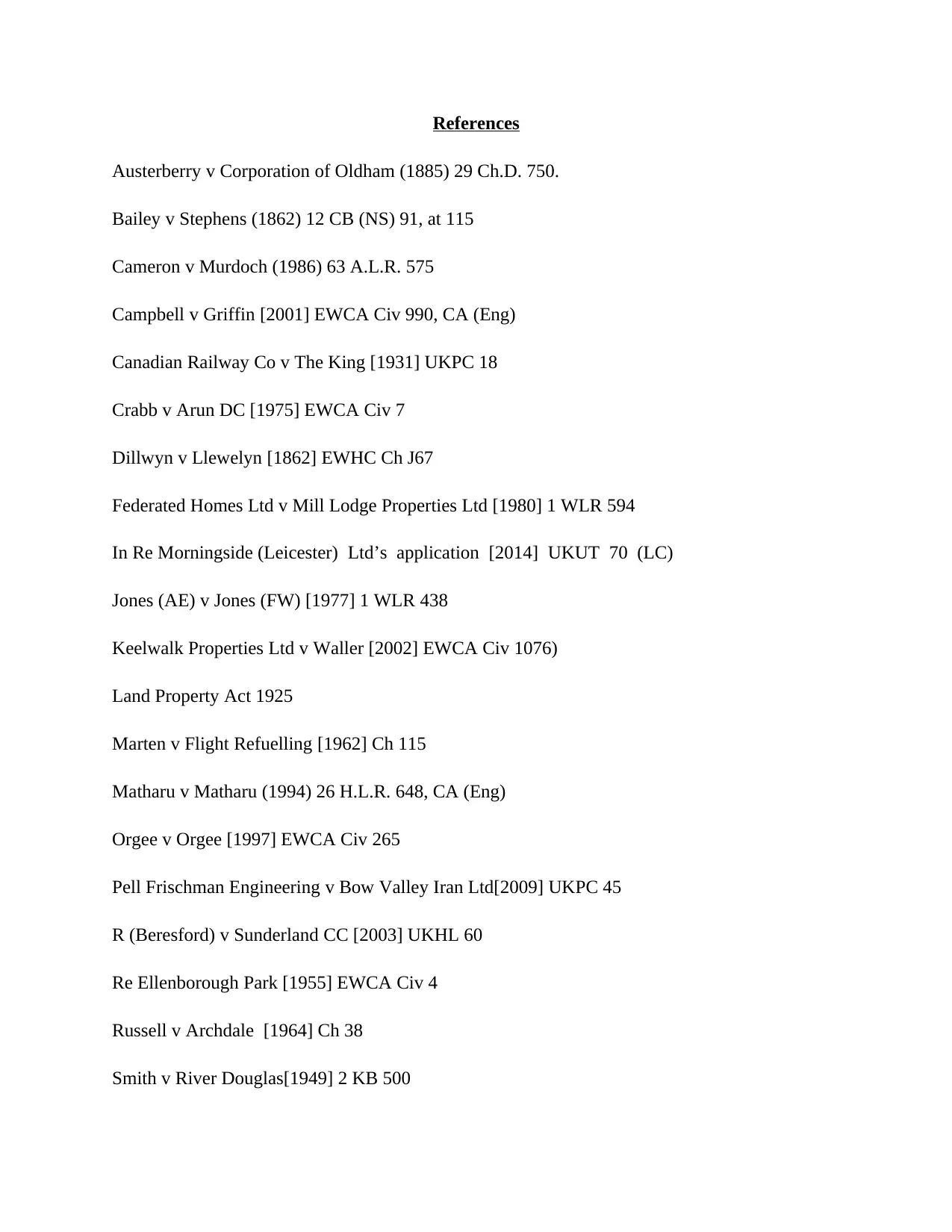
References
Austerberry v Corporation of Oldham (1885) 29 Ch.D. 750.
Bailey v Stephens (1862) 12 CB (NS) 91, at 115
Cameron v Murdoch (1986) 63 A.L.R. 575
Campbell v Griffin [2001] EWCA Civ 990, CA (Eng)
Canadian Railway Co v The King [1931] UKPC 18
Crabb v Arun DC [1975] EWCA Civ 7
Dillwyn v Llewelyn [1862] EWHC Ch J67
Federated Homes Ltd v Mill Lodge Properties Ltd [1980] 1 WLR 594
In Re Morningside (Leicester) Ltd’s application [2014] UKUT 70 (LC)
Jones (AE) v Jones (FW) [1977] 1 WLR 438
Keelwalk Properties Ltd v Waller [2002] EWCA Civ 1076)
Land Property Act 1925
Marten v Flight Refuelling [1962] Ch 115
Matharu v Matharu (1994) 26 H.L.R. 648, CA (Eng)
Orgee v Orgee [1997] EWCA Civ 265
Pell Frischman Engineering v Bow Valley Iran Ltd[2009] UKPC 45
R (Beresford) v Sunderland CC [2003] UKHL 60
Re Ellenborough Park [1955] EWCA Civ 4
Russell v Archdale [1964] Ch 38
Smith v River Douglas[1949] 2 KB 500
Austerberry v Corporation of Oldham (1885) 29 Ch.D. 750.
Bailey v Stephens (1862) 12 CB (NS) 91, at 115
Cameron v Murdoch (1986) 63 A.L.R. 575
Campbell v Griffin [2001] EWCA Civ 990, CA (Eng)
Canadian Railway Co v The King [1931] UKPC 18
Crabb v Arun DC [1975] EWCA Civ 7
Dillwyn v Llewelyn [1862] EWHC Ch J67
Federated Homes Ltd v Mill Lodge Properties Ltd [1980] 1 WLR 594
In Re Morningside (Leicester) Ltd’s application [2014] UKUT 70 (LC)
Jones (AE) v Jones (FW) [1977] 1 WLR 438
Keelwalk Properties Ltd v Waller [2002] EWCA Civ 1076)
Land Property Act 1925
Marten v Flight Refuelling [1962] Ch 115
Matharu v Matharu (1994) 26 H.L.R. 648, CA (Eng)
Orgee v Orgee [1997] EWCA Civ 265
Pell Frischman Engineering v Bow Valley Iran Ltd[2009] UKPC 45
R (Beresford) v Sunderland CC [2003] UKHL 60
Re Ellenborough Park [1955] EWCA Civ 4
Russell v Archdale [1964] Ch 38
Smith v River Douglas[1949] 2 KB 500
⊘ This is a preview!⊘
Do you want full access?
Subscribe today to unlock all pages.

Trusted by 1+ million students worldwide

Tulk v Moxhay [1848] EWHC J34 (Ch)
1 out of 10
Your All-in-One AI-Powered Toolkit for Academic Success.
+13062052269
info@desklib.com
Available 24*7 on WhatsApp / Email
![[object Object]](/_next/static/media/star-bottom.7253800d.svg)
Unlock your academic potential
© 2024 | Zucol Services PVT LTD | All rights reserved.
